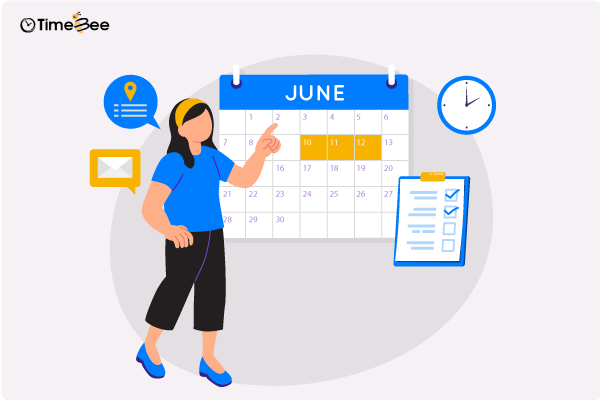Content
Content
It’s no secret that successful brands partner with creative agencies to become their best selves. Since creative flair may not be their forte, it is only practical to hire agencies specialized in this field to take over the creative reins of a business.
However, balancing administrative responsibilities with creative demands can be draining.
In an overly competitive landscape, ignoring the administrative side of your business may equal suicide. Creative minds need artistic expression and out-of-the-box thinking, but they also require excellent resource management skills to deliver expected results.
Why is Time-Tracking Important for Creative Agencies?
In the fast-paced world of creative agencies, efficient time management isn’t just useful; it’s essential. Creative experts juggle a multitude of tasks, demanding ingenuity and analytical expertise. Throw in the pressing deadlines, and you have yourself a pressure cooker.
Keeping track of your time in such a swirl of activity may seem impossible. You may end up spending each day wondering, ‘Gee! Where did the time go?’
That’s where this blog comes into play: realizing the importance of time-tracking for a creative agency. We will also discuss how you can leverage it to polish your creative potential.
Here are 7 reasons why your creative agency should start tracking time ASAP:
1. Get Actionable Data
The most important reason for time tracking is to gain insight into task durations. This knowledge allows you to make data-driven business decisions rather than guesswork.
For example, using timesheets, you can learn which tasks consume more time than others. Similarly, you can identify how the projects you’re doing consume your resources.
Using this data, you can negotiate with clients for additional time or funds with actionable insights to back up your claims.
Simultaneously, you may rework the resource allocation planning for your creative team.
2. Enhanced Productivity
Time tracking enables you to gain insights into how and where you spend the day. For example, employee productivity reports may reveal that your workers are spending more time on administrative tasks rather than work.
Being accountable for your productivity can be a powerful weapon. Workers may be surprised to see the amount of time-robbing activities and unproductive work patterns they’re involved in half of the day. This can help them to refocus their time and prioritize critical tasks, such as content creation and research.
For Better Project Visibility, Accurate Data, Time Tracking
Get TimeBee Today
Additionally, using distraction alerts can zap creatives out of snoozefest and bring their attention back to the tasks at hand.
The result? An instant boost of productivity in the right direction.
3. Accurate Estimation of Project Timelines
An accurate project timeline estimate is crucial for you and your clients. A time-tracking mechanism will provide a practical time frame for planning projects. This may allow you to allocate time and other resources adequately for each step of the process.
Starting a project with unrealistic optimism about time management may lead to dire situations. In addition to avoiding embarrassment, using real-time data can help you set realistic project expectations from start to end.
Also, time tracking can help you establish client trust by sharing real-time project progress and data that gives them a transparent view of deliverables.
4. Seamless Payroll Management
Data from automated timesheets can provide everything needed to calculate accurate payrolls. Using the total hours tracked and per-hour rate, you can deduce the payroll for each employee.
Transparent payroll data can be shared with employees to show how their productivity is linked to their compensation, resolving any possible trust issues.
5. Precise Job Costing
Time tracking enables you to estimate precise labor costs. If you’ve established total billable hours for projects before, you can refer to similar past projects to deduce the exact man-hours and workers required for completion.
As a bonus, the project costing can give you a detailed breakdown of the billable hours spent. From sessions of ideation, creative exploration, testing, adjustments, researching, and ultimately, the actual time spent completing the project, you have everything to make future project estimations.
6. Accurate Billing
In continuation to the above point, data from time tracking can help you bill clients accurately. With a comprehensive breakdown of the total billable hours incurred during a project, you have ample proof to create and back client invoices. With clear invoices, there may be fewer chances for payments to get stalled.
Smart tracking tools also offer automatic screen captures, which are periodic screenshot proofs of activity. For clients with sour experiences with clumsy agencies, sharing screenshots of project progress at random steps can be a game-changer.
Such transparency can build client trust and a long-lasting reputation for your creative agency.
7. Enables Delegation and Resource Optimization
Automated time tracking is an asset for agile and proactive management.
With access to real-time dashboards, you’ll be able to see which employee or team is in the capacity to work more and who risks getting burned out. You can then use these insights to reassign or delegate tasks accordingly. Delegation can free up time for tasks that need your critical attention.
Best Practices for Implementing Time Tracking at Your Creative Agency
Even with an elaborate list of reasons and benefits for adopting time tracking, your team members may not be too happy about it. This is because of the inherent nature of corporate surveillance.
Here are some tips that can guide you on successfully rolling out time tracking at your creative agency.
- Set Clear Expectations
Communicating your expectations from incorporating time tracking in your agency is a great way to start. Spell out what needs to be achieved, what areas you want to improve, how everyone will benefit from it, and why people should comply with it.
Setting clear expectations will help bring everyone on board and communicate your rationale for adopting time-tracking practices.
- Make it About ‘Them’
When rolling time-tracking, make sure you maximize its benefits for employees.
Talk about how accurate time tracking will lead to smoother payroll calculation. Emphasize how team dashboards can highlight the white knights of your team so they can be rewarded. Also, touch base about monitoring output to prevent burnout and foster delegation. When you involve your creative team in using tracking for their benefit, chances are they won’t resist.
- Get an Automated Tracker
The simpler the tracking system, the less apprehension they may have around it.
Manual spreadsheets and time updates are anything but simple: They are prone to damage, get lost, and are hard to keep track of. Investing in a modern, automated time tracker can resolve all these issues.
Automated trackers are straightforward to use and require minimum manual input. They only need one click to record and categorize your time throughout the day.
Looking for a User-friendly Time Tracker?
Click Here to Download TimeBee
- Keep it Transparent
While you can always limit the visibility of data, sharing some viewing privileges with the teammates, particularly their data, may be a good idea.
This may help foster accountability and motivate them to improve their performance. If they can view other teammates, it may promote healthy competition to outperform others.
In the end, it may benefit the whole organization.
- Don’t Over-track
Tracking every little detail of employees’ workdays may put you under the heat. Not only is it unethical to monitor your colleagues without consent, but it is also illegal in some places.
We advise sticking to basics and keeping your life manageable without over-tracking. Give workers a sense of empowerment and freedom by not using insights from tracking data to change their work domains.
Remember, you want them on your team.
Summing Up
Now that we have listed some tips to smooth out your time-tracking practices, let us state that time-tracking only works when done diligently. Half-hearted time tracking will fail to produce results and may cost you time, money, and mental fatigue.
Ensure you comply with daily time tracking and that everyone on the team is involved to get the best, most accurate results. Time tracking can transform your creative agency from chaotic disarray to a team that only produces quality deliverables.
Similar Reading



